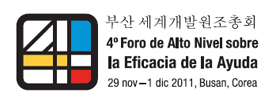The declaration outlines shared principles, addresses the complexity of new actors in development aid, and commits to actions for progress toward the MDGs.
It also calls for the creation of a Global Partnership for Effective Development Cooperation to monitor the implementation of commitments, and identifies sustainable development as the end goal of effective cooperation.
 1 December 2011: The Fourth High-Level Forum on Aid Effectiveness adopted a declaration titled the “Busan Partnership for Effective Development Cooperation.” The Forum reviewed global progress on aid effectiveness, including a review of targets set in the 2005 Paris Declaration on Aid Effectiveness, shared experiences in delivering the best results, and developed new commitments toward effectiveness of aid in reducing poverty, achieving the Millennium Development Goals (MDGs), and supporting development beyond 2015.
1 December 2011: The Fourth High-Level Forum on Aid Effectiveness adopted a declaration titled the “Busan Partnership for Effective Development Cooperation.” The Forum reviewed global progress on aid effectiveness, including a review of targets set in the 2005 Paris Declaration on Aid Effectiveness, shared experiences in delivering the best results, and developed new commitments toward effectiveness of aid in reducing poverty, achieving the Millennium Development Goals (MDGs), and supporting development beyond 2015.
The Forum (HLF-4) took place in Busan, Republic of Korea, from 29 November-1 December 2011, and was organized by the Republic of Korea and the Organisation for Economic Co-operation and Development (OECD). According to the Forum’s press release, the declaration was negotiated and agreed by 18 sherpas elected to represent a wide group of stakeholders.
The declaration establishes the first framework for development cooperation that reflects a diversity of actors – traditional donors as well as emerging donors (in particular Brazil, India and China), civil society and the private sector. The declaration outlines shared principles, addresses the complexity of new actors in development aid, and commits to actions for progress toward the MDGs. It also: calls for the creation of a Global Partnership for Effective Development Co-operation to monitor the implementation of commitments; identifies sustainable development as the end goal of effective cooperation; and commits to implementing by 2015 a common, open standard for electronic publication of aid and development information.
Participants agree to take action to facilitate, leverage and strengthen the impact of diverse sources of finance to support sustainable and inclusive development, including taxation and domestic resource mobilisation, private investment, aid for trade, philanthropy, non-concessional public funding and climate change finance. They identify common principles that form the foundation of co-operation for effective development: ownership development priorities by developing countries; focus on results; inclusive development partnerships; and transparency and accountability to each other.
The new Global Partnership for Effective Development Co-operation is called on to support implementation at the political level. The OECD and UNDP are invited to support the effective functioning of the Global Partnership.
The declaration indicates that providers of development assistance have a responsibility to reduce fragmentation and curb the proliferation of aid channels and commits, by 2013, to make greater use of country-led co-ordination arrangements, and by 2012, to agree on principles and guidelines to guide their joint efforts. On global climate finance, the declaration indicates that participants will endeavour to promote coherence, transparency and predictability across their approaches for effective climate finance and broader development co‐operation.
By June 2012, participants will agree on a selective and relevant set of indicators and targets through which to monitor progress on a rolling basis, supporting international and regional accountability for the implementation of the commitments. The UN Development Cooperation Forum is invited to play a role in consulting on the implementation of agreements reached in Busan.
In comments to the Forum, the UN Secretary-General urged “the growing club of new and emerging donor countries” to assume their new leadership and increase their role as donors, and told the private sector to pursue partnerships. Ban also outlined three principles for effective aid: accountability in aid commitments and delivery, flexibility of countries to react to shocks and changes, and ownership of recipients over the use of aid. He also noted his request to the UN system to develop an Integrated Implementation Framework, to enable monitoring of global commitments to the MDGs and their delivery.
In preparation for the Forum, the OECD published an evaluation of development cooperation and aid effectiveness, which found increased fragmentation of development aid and said nearly all 56 commitments of the Paris Declaration remain to be fully implemented. [Busan Declaration] [HLF-4 Website] [UNDP Website on HLF-4] [UN Women Website on HLF-4] [Statement of UN Secretary General] [UN Press Release, 29 November] [UN Press Release, 30 November] [UN Press Release, 1 December] [Publication: The Evaluation of the Paris Declaration Phase 2] [Sustainable Development Policy & Practice Story on OECD Evaluation]